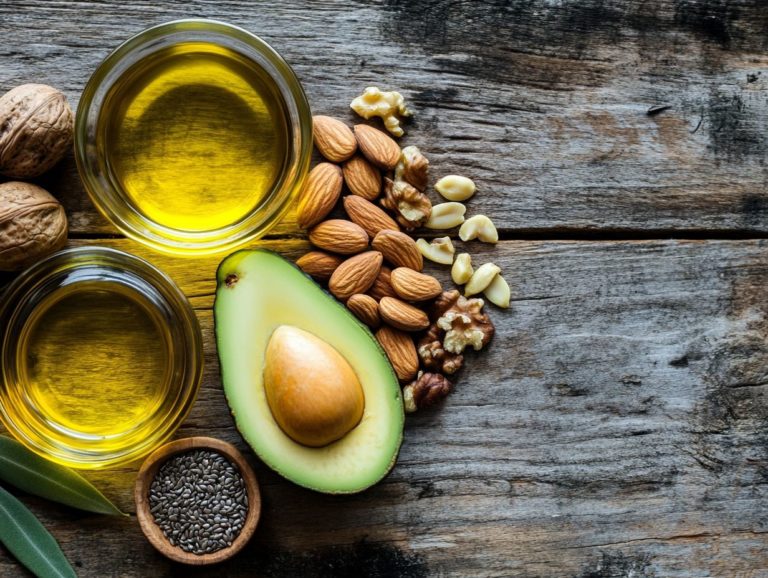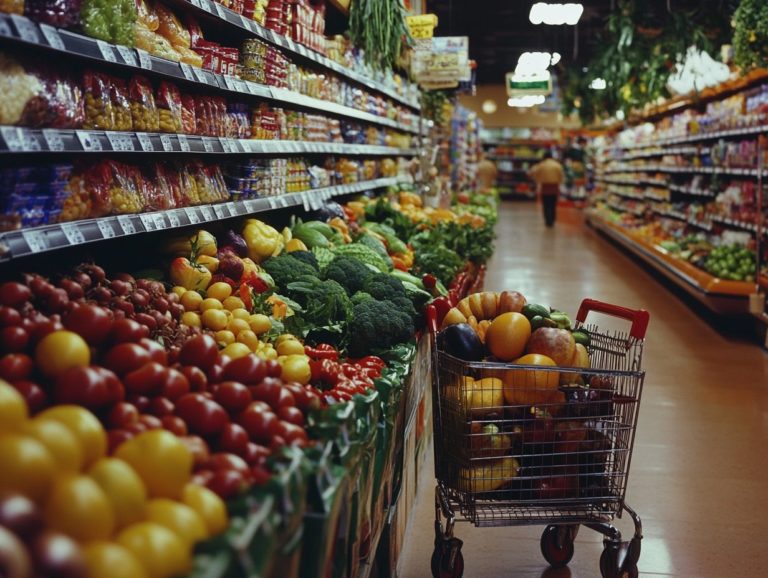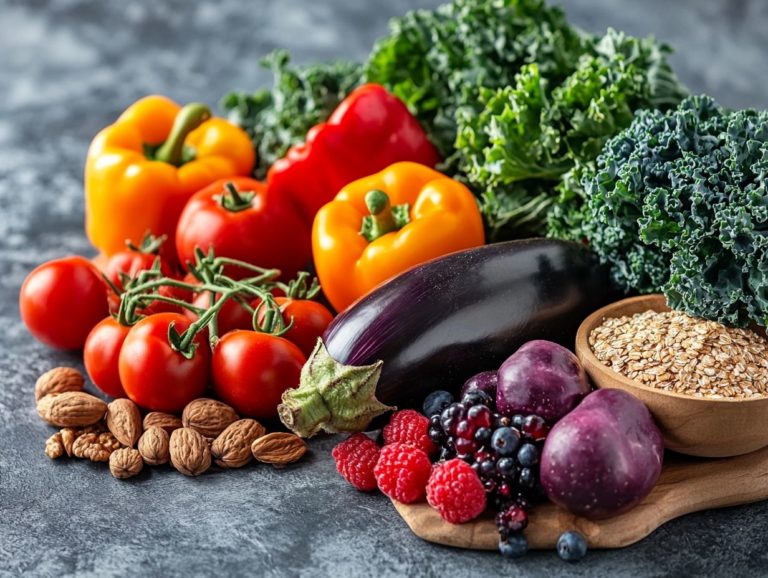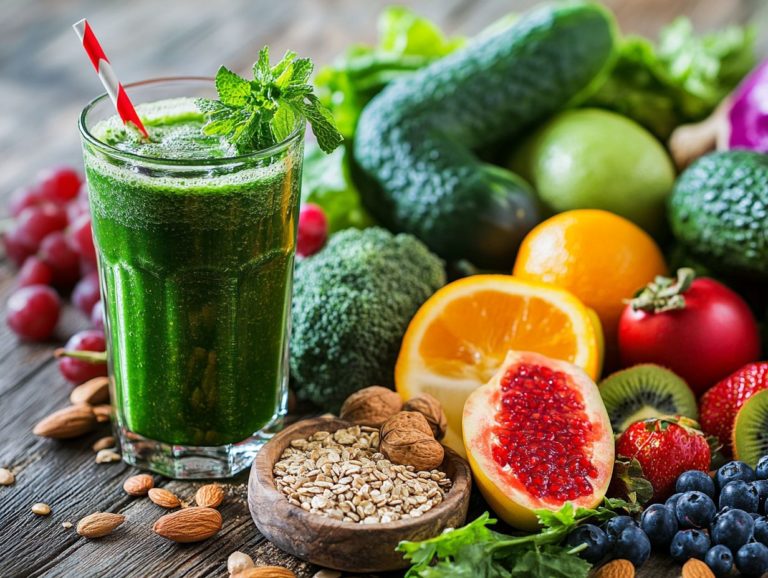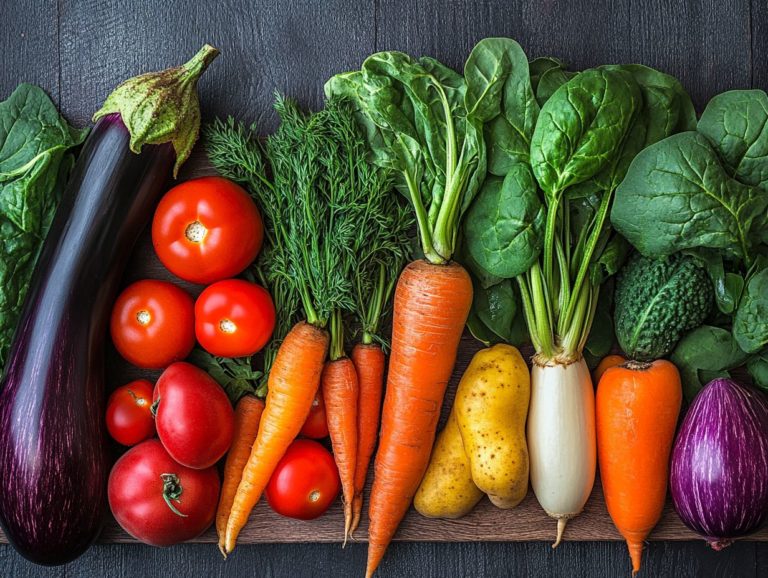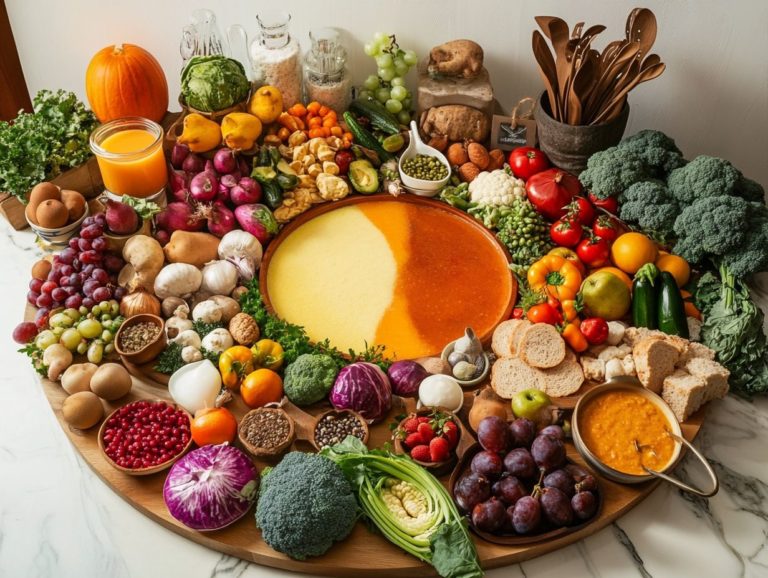The Benefits of Cooking with Kids
Cooking with kids transcends mere meal preparation; it becomes a remarkable avenue for growth, learning, and connection.
Consider the myriad benefits for children, ranging from developmental milestones to vital life skills acquired in the kitchen. Parents, too, savor these moments, relishing the bonding experiences and invaluable teaching opportunities that arise.
Discover age-appropriate tasks, inventive recipe ideas, and tips to transform cooking into an enjoyable and safe adventure. Involving your kids in the kitchen can be a transformative experience for the entire family!
Contents
Key Takeaways:
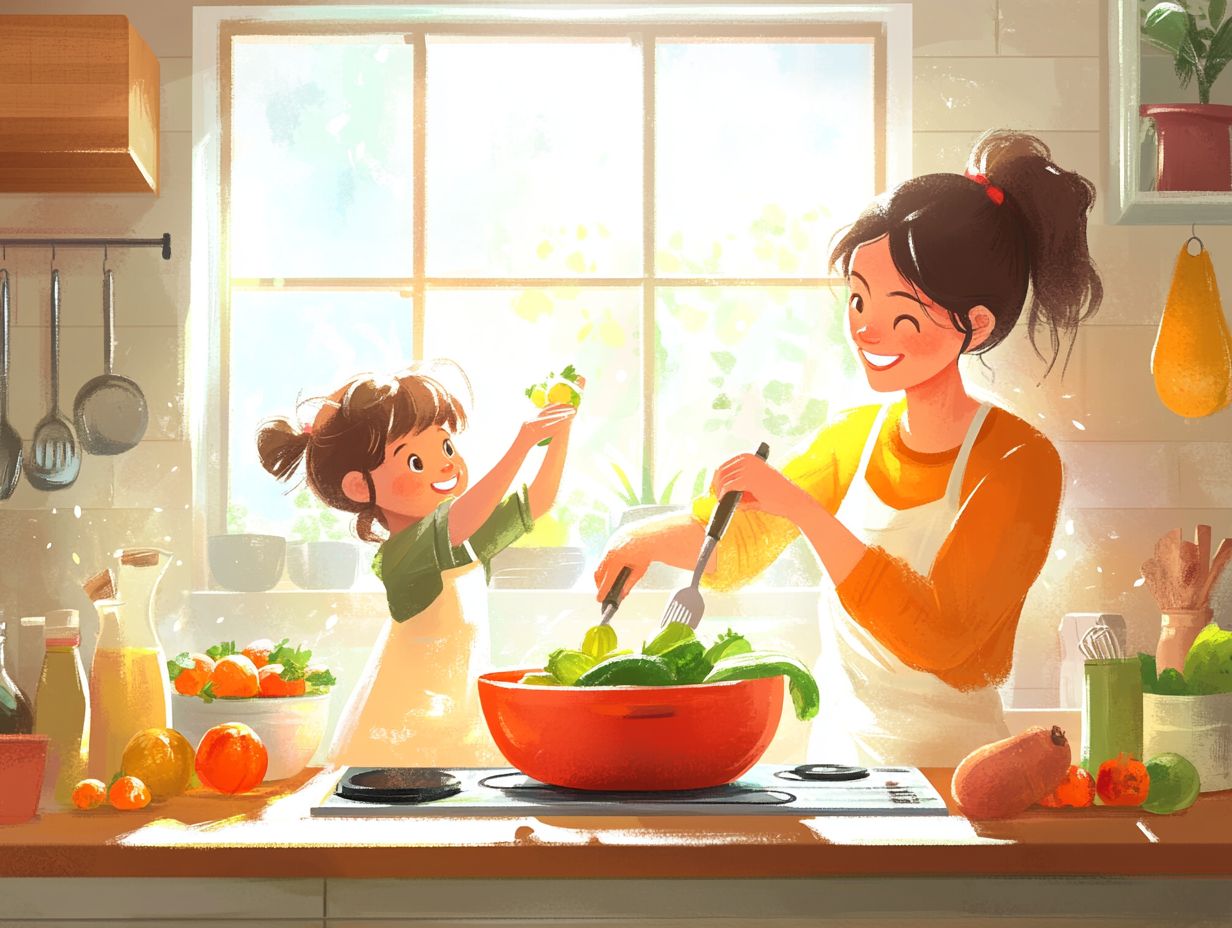
Benefits for Children
The benefits of cooking for children stretch well beyond the mere act of meal preparation; they encompass a range of vital developmental advantages that can significantly enhance their lives.
By involving kids in cooking lessons, you not only sharpen their cooking skills but also foster their understanding of healthy diets and nutrition.
As they dive into new recipes and experience a variety of foods through cooking activities, they become adventurous eaters, refining their food preferences and gaining invaluable kitchen experience.
Why it Matters
Understanding the significance of cooking with kids is crucial in today s fast-paced world. It not only fosters creativity and independence but also promotes healthy eating habits that can last a lifetime.
When you engage your children in kitchen tasks, meal preparation transforms into a bonding experience that aligns with family traditions. This interaction serves as a powerful educational tool, helping them grasp food choices and develop an appreciation for nutritious meals, all while being mindful of food allergies and safety.
Involving them in cooking opens the door to learning about nutrition, allowing them to explore the benefits of various ingredients and discover the joy of preparing wholesome dishes together. This interactive experience enhances their culinary abilities and instills a sense of responsibility and teamwork as they contribute to family meals.
Those shared moments around the dinner table, enriched by these cooking activities, reinforce family values and create lasting memories while teaching lifelong skills that extend far beyond the kitchen.
Developmental Advantages
Cooking is an exciting way for kids to develop important skills! It offers many developmental benefits, particularly in refining their motor skills and deepening their sensory experiences.
As they dive into kitchen tasks, they hone small movements of their hands and fingers through chopping, stirring, and measuring ingredients. This not only sharpens their cooking skills but also enhances their overall dexterity.
The kitchen is a sensory wonderland, inviting them to explore textures, colors, and aromas, which fosters a deeper engagement with the cooking process. This hands-on experience sharpens their hand-eye coordination and encourages problem-solving as they navigate recipes and make necessary adjustments.
In this lively classroom of culinary exploration, they learn about measuring and counting, reinforcing mathematical concepts in a fun and immersive way. The decision-making involved in selecting ingredients introduces them to healthy eating habits, instilling a sense of nutritional awareness from an early age.
Don t miss out! Cooking provides amazing developmental benefits for your kids! Through these captivating activities, cooking transcends the realm of mere chore; it evolves into a delightful learning journey that nurtures creativity and ignites curiosity.
Start your culinary adventure today and watch your kids thrive!
Life Skills Learned
Through cooking, you empower children to acquire essential life skills that extend far beyond the kitchen. This lays the groundwork for independence and self-sufficiency in their future.
As they delve into valuable cooking techniques and engage in meal planning, they cultivate a deep understanding of healthy eating and its significance for their health. Learning kitchen safety enhances their skills and equips them with the knowledge to make informed food choices.
This journey also fosters creativity as they experiment with flavors and ingredients. They hone critical thinking skills as they measure, mix, and monitor cooking times.
Involving children in the cooking process nurtures teamwork and social skills when they work with family or friends. They share responsibilities and communicate effectively.
By embracing these enriching experiences, they develop a sense of accomplishment that boosts their confidence. This reinforces the importance of planning ahead, ensuring they grow into capable individuals ready to tackle both culinary challenges and the demands of everyday life.
Benefits for Parents
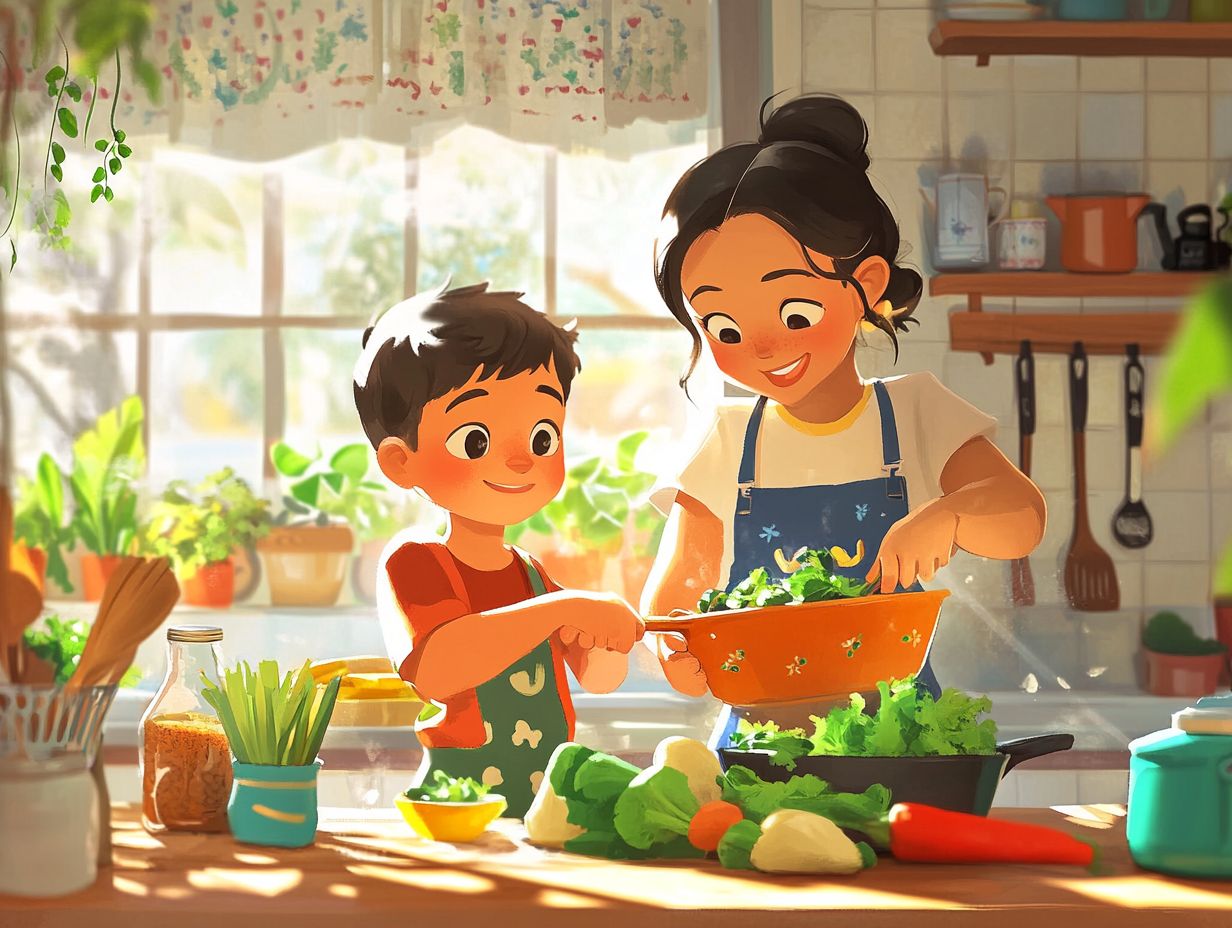
You can experience significant benefits when you involve your children in cooking. This nurturing activity fosters valuable bonding experiences that strengthen family ties.
This shared experience of preparing family meals inspires open discussions about food. It encourages your kids to share their cooking insights and tackle culinary challenges as a team.
Join the fun in the kitchen! Don’t miss out on these bonding moments!
Bonding Opportunities
Cooking together becomes an extraordinary opportunity for you and your family to bond. You craft cherished memories while reinforcing traditions that can be lovingly passed down through generations.
When you collaborate in meal preparation, you not only acquire essential culinary skills but also enhance your communication abilities. This deepens your relationships in the process.
Each recipe you tackle may come with its own story or cultural significance. This transforms the act of cooking from a mere chore into a vibrant celebration of heritage.
As you gather around the kitchen counter, chopping vegetables or rolling dough, you’re sharing laughter, stories, and invaluable life lessons. These shared moments of teamwork and creativity culminate in delightful meals that cultivate a sense of togetherness.
Transform cooking into a family adventure! Make memories that last a lifetime!
Teaching Moments
Every cooking session offers you unique teaching moments that allow you to impart invaluable lessons about cooking and nutrition to your children. By engaging them in the cooking process, you develop essential culinary skills while emphasizing the significance of nutritional balance and healthy eating habits.
For instance, discussing the benefits of various ingredients like the importance of whole grains, fruits, and vegetables can ignite a dialogue about food origins and their nutritional profiles. You can also emphasize safety precautions, such as proper knife handling and avoiding cross-contamination, while introducing basic cooking techniques.
Each of these moments cultivates essential life skills. Teach your children to appreciate the broader implications of their food choices on their health and the environment.
How to Get Kids Involved in the Kitchen
Involving kids in the kitchen is a truly rewarding experience. You can tailor activities to fit their unique ages and abilities, ensuring they actively participate in meal preparation.
Introduce age-appropriate tasks that resonate with their developmental stages. Gradually escalate to more complex cooking activities as they mature.
By offering a variety of cooking opportunities, you cultivate a nurturing environment that encourages learning and skill-building. All of this is achieved through the joy of cooking together.
Get started today and make cooking a family tradition!
Age-Appropriate Tasks and Recipes
Choosing age-appropriate tasks and recipes is essential for successfully involving children in cooking. This approach not only builds their confidence but also ignites their enthusiasm in the kitchen.
For younger children, simple tasks like washing vegetables or stirring ingredients help develop basic cooking skills. Older kids can take on more complex challenges, such as reading recipes and measuring ingredients. These cooking activities transform meal preparation into an enjoyable experience and support their gradual learning journey.
For instance, toddlers might find joy in assembling simple sandwiches or decorating cookies. This allows them to express their creativity while honing fine motor skills. As children transition into pre-teens, they can explore more intricate recipes like homemade pasta or a veggie stir-fry. These require them to follow steps that involve a series of actions and grasp cooking times.
These experiences empower kids to take ownership of their food choices, reinforcing healthy eating habits and fostering a sense of accomplishment. Engaging in the kitchen nurtures not just cooking skills but also essential life skills. It encourages teamwork and patience as they share the process with family members.
Tips for a Successful Cooking Experience
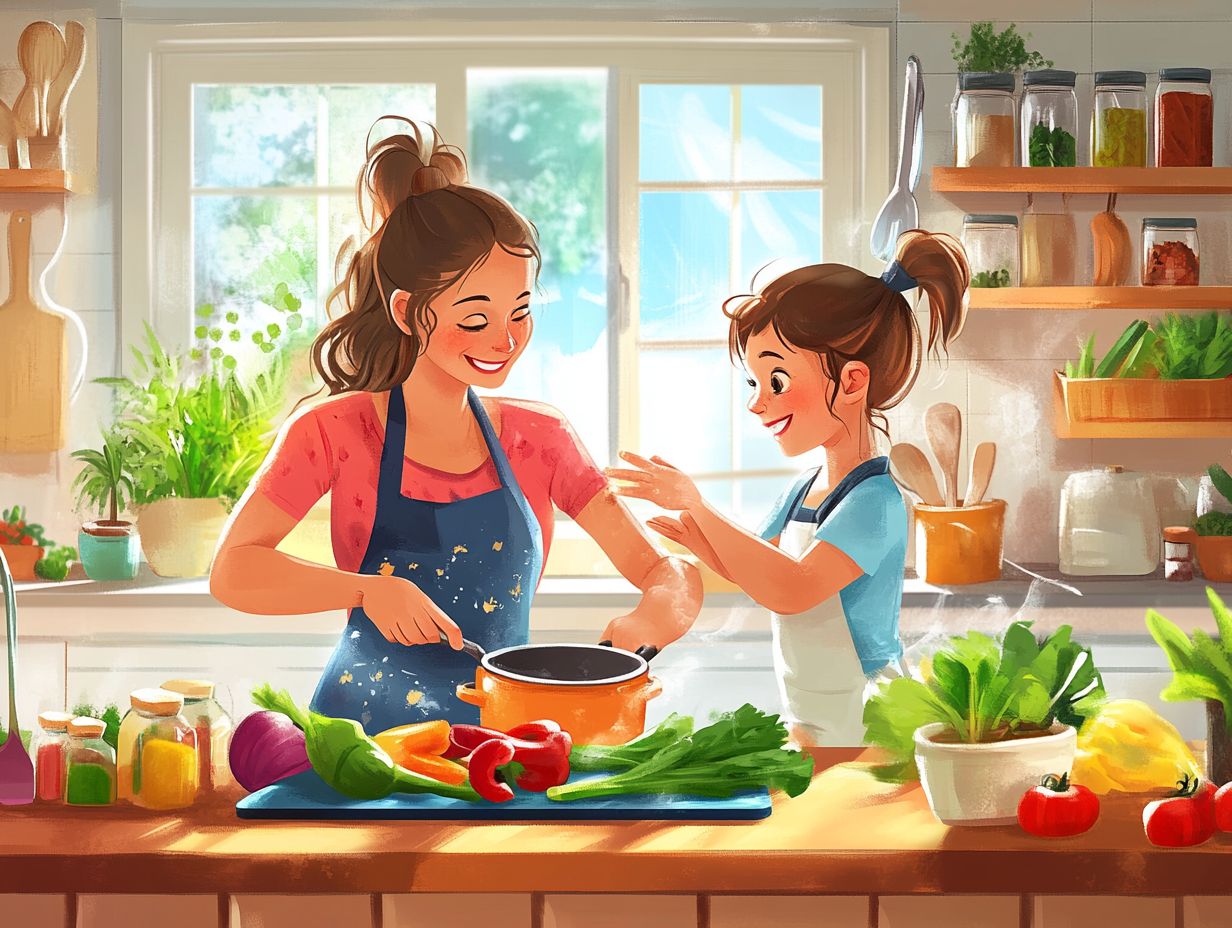
Creating a successful cooking experience for your children hinges on cultivating a safe and enjoyable environment where they can truly thrive in the kitchen.
Implement safety measures to minimize risks. This empowers kids to learn cooking skills with confidence.
Encouraging their creativity during meal preparation fosters independence. It transforms cooking challenges into fun and engaging adventures, inspiring a genuine passion for cooking.
Creating a Safe and Fun Environment
Establishing a safe and enjoyable atmosphere in the kitchen is crucial for fostering positive cooking experiences for your children. Implement essential safety measures, like close supervision and teaching proper handling of kitchen tools, while ensuring they are aware of food allergies to create a secure environment.
Encouraging your kids to explore different cooking techniques while following safety protocols helps them develop a sense of responsibility and confidence in their cooking skills.
Creating a vibrant culinary space goes beyond safety; it also involves engagement. Introduce age-appropriate tasks that allow young chefs to participate actively without feeling overwhelmed.
Incorporating various cooking methods, like baking, saut ing, or roasting, lets kids experience a world of flavors and textures, sparking their creativity. Discussing the importance of cleanliness, like washing hands and maintaining an organized workspace, deepens their understanding of hygiene and discipline.
This delightful combination of fun and education ensures that cooking becomes an enjoyable activity rather than a chore, cultivating a lifelong appreciation for cooking.
Encouraging Independence and Creativity
Encouraging cooking independence and creativity in children is essential for fostering their passion for cooking. It allows them to express their imagination while preparing meals.
By involving them in age-appropriate tasks like measuring, mixing, and even planning meals you can create an environment that celebrates experimentation.
Picture this: hosting a create your own pizza night where kids can choose unexpected toppings, igniting their inventiveness.
Introducing them to ideas like combining flavors and seasonal cooking can deepen their appreciation for ingredients and how they work together.
The kitchen is an incredible platform for hands-on learning, where young chefs can explore their tastes and preferences through interactive experiences. This journey leads to fun cooking experiences.
Frequently Asked Questions
What are the benefits of cooking with kids?
Cooking with kids is a fun way to boost their skills and confidence! It also helps develop their motor skills, encourages healthier eating habits, and fosters creativity.
Try cooking with your kids today and watch their creativity soar!
How does cooking with kids help develop motor skills?
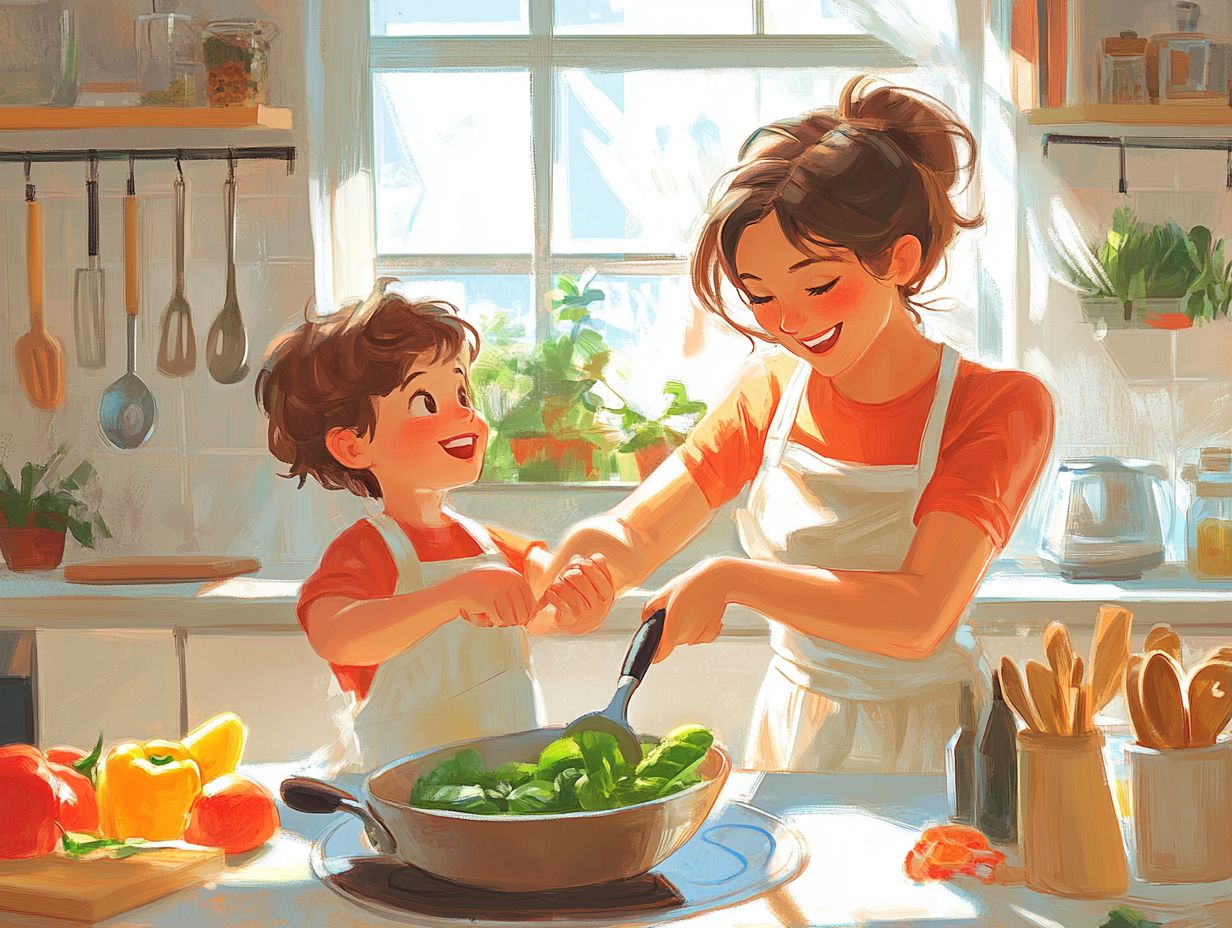
Measuring ingredients and stirring helps improve the ability to use hands and eyes together. Cutting with safe tools enhances fine motor skills.
Why is cooking with kids beneficial for their confidence?
Involving children in the cooking process gives them a sense of accomplishment. This boosts their pride and self-esteem.
How can cooking with kids encourage healthier eating habits?
When kids help cook, they are more likely to try new foods. This helps them appreciate nutritious meals.
What are some other benefits of cooking with kids?
Cooking together improves reading and math skills. It teaches kitchen safety and provides quality bonding time.
At what age can kids start cooking?
Kids can start helping in the kitchen at 2-3 years old. Tasks should be age-appropriate for safety and learning.

